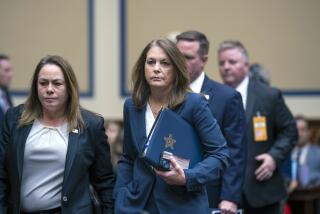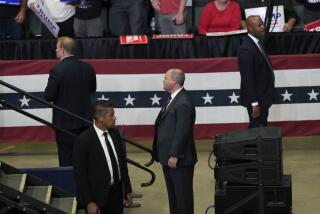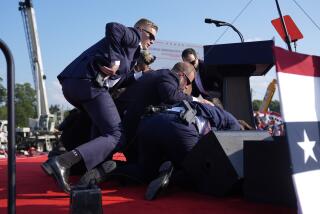Secret Service Agents Must Testify, Court Says
- Share via
WASHINGTON — In a significant victory for independent counsel Kenneth W. Starr, an appellate court ruled Tuesday that Secret Service employees must tell the Monica S. Lewinsky grand jury what they saw or learned of President Clinton’s relationship with the former White House intern.
The three-judge panel, in refusing to create a new Secret Service privilege, rejected claims by Treasury and Justice department officials that compelling the testimony could imperil the safety of presidents by tempting them to push away their “protective envelope.”
The ruling moves Starr one step closer to obtaining testimony from perhaps the last impartial and credible witnesses in his investigation of the Clinton-Lewinsky matter. Two Secret Service agents and one attorney for the agency are believed to have information relevant to his case. He is trying to determine whether Clinton and Lewinsky had a sexual relationship and whether the president urged her to lie about it.
The judges handed down their opinion as Pentagon employee Linda Tripp, another key witness for Starr, completed her third day of testimony before the grand jury. A Maryland prosecutor, meanwhile, said he is launching a state grand jury inquiry into whether Tripp may have violated state law by making the recordings without Lewinsky’s knowledge.
The Secret Service dispute arose earlier this year after Starr’s prosecutors summoned the witnesses to tell what they knew about Lewinsky’s relationship with Clinton. Secret Service Director Lewis C. Merletti and his boss, Treasury Secretary Robert E. Rubin, objected to such testimony on grounds that it could compromise the trust and confidence between a president and his protective detail.
On May 22, however, after studying legal briefs and arguments by both sides, Chief U.S. District Judge Norma Holloway Johnson ruled that the Secret Service employees must testify, saying they are part of the federal law enforcement establishment sworn to assist in criminal investigations.
Despite Tuesday’s ruling, it seems unlikely that Starr will obtain the Secret Service testimony before the end of summer.
In affirming Johnson’s opinion, the appellate judges gave Treasury and Justice officials seven days to petition for a rehearing by the full 11-member Court of Appeals. Officials said they will study the ruling before deciding on a course of action.
If the full court should agree with its three-judge panel, the most likely development, a further appeal by the administration to the Supreme Court could delay Secret Service testimony until at least October, when the high court’s next term begins.
Justice and Secret Service officials said they are “disappointed” by Tuesday’s ruling and soon will decide whether to appeal.
The three-judge panel, without dissent, found that Treasury and Justice officials had shown no “clear and convincing” reason why Secret Service agents should be given a special “protective function privilege” against testifying in a criminal investigation.
The court said that, if executive branch officials believe such a privilege should exist, they should take their case to Congress.
“We leave to the Congress the question whether a protective function privilege is appropriate in order to ensure the safety of the president and, if so, what the contours of that privilege should be,” the judges said.
“This appears to be the first effort in U.S. history to compel testimony by agents guarding the president,” the court said.
Agents who witness a clear crime, such as a president accepting an obvious bribe on a golf course, always have been required to report it as part of their law enforcement function. What Starr has sought, however, and what the appellate panel upheld, is the right of a prosecutor to question agents about circumstances they have observed that are later deemed relevant to an ongoing criminal investigation involving the president.
The judges, handing down their decision with unaccustomed speed less than two weeks after hearing oral arguments, gave several reasons for refusing to carve out a special exemption to excuse Secret Service agents from testifying.
They noted that Clinton himself has not declared the need for such a privilege, leaving it to Treasury and Justice department officials to argue the case.
“We also think the efficacy of the privilege is undermined by its being vested in the secretary of the Treasury and not in the president, whose conduct the proposed privilege is supposed to influence,” the court said.
“We know of no other privilege that works that way.”
The judges cited a letter from White House Counsel Charles F. C. Ruff declaring that “the privilege is not [the president’s] to assert or to waive.” This statement, the court said, “reinforces our impression that the proposed protective function privilege will provide only a weak incentive for the president to keep his protectors in close proximity.”
And even former presidents are not unanimous in their belief that compelling Secret Service testimony in a criminal investigation would cause chief executives to push away their protective detail, the judges said.
Although former President Bush endorsed a Secret Service exemption, ex-Presidents Ford and Carter said Secret Service personnel should be required to give testimony when warranted, the court noted.
The judges also said that Clinton is prudent enough not to push away his agents for fear they will see or hear something that could compromise him.
“The president has a profound personal interest in being well protected and the president knows that effective protection depends upon proximity to his protectors,” the court said.
It added that “the greatest danger to the president arises when he is in public, yet the privilege presumably would have its greatest effect when he is in the White House or in private meetings.”
Starr, who had suffered recent setbacks, including dismissal of his criminal tax case against Webster L. Hubbell and the release from prison of defendant Susan McDougal, issued a statement saying he is “gratified by . . . the prompt resolution of the Secret Service’s appeal in this case.”
“It is fundamental in our country that all law enforcement officers cooperate fully in responding to requests for relevant information in a federal grand jury investigation,” he continued.
“We trust that the Secret Service will now join us in helping the grand jury gather information that is relevant to this investigation.”
Tripp’s closed-door testimony reportedly has focused on the 20 hours of phone conversations that she secretly tape-recorded with Lewinsky in which the 24-year-old woman told of a relationship with the president and urged Tripp to lie about it in a civil lawsuit. She is scheduled to return on Thursday.
As Tripp emerged from her grand jury testimony, her lawyer, Anthony J. Zaccagnini, branded the Maryland prosecutor’s grand jury announcement as “politically motivated and selective in nature.”
He read a statement from Tripp saying: “I believe today’s announcement is the latest in a series of attempts to intimidate me, but I am not intimidated in any way.”
Judy A. Smith, a spokeswoman for Lewinsky, said: “Every American has the right to, and the expectation of, privacy in . . . private conversations. The decision [to impanel a grand jury] . . . will help establish that our cherished right of privacy cannot be trampled on.”
Until Stephen Montanarelli, the prosecutor, disclosed that a grand jury inquiry had been initiated in Howard County, Md., where Tripp lives, it was expected that the state investigation would be delayed until Tripp had finished testifying. But she will appear before the Lewinsky grand jury at least one more day.
Times staff writers Erin Trodden and David Willman contributed to this story.
More to Read
Sign up for Essential California
The most important California stories and recommendations in your inbox every morning.
You may occasionally receive promotional content from the Los Angeles Times.













